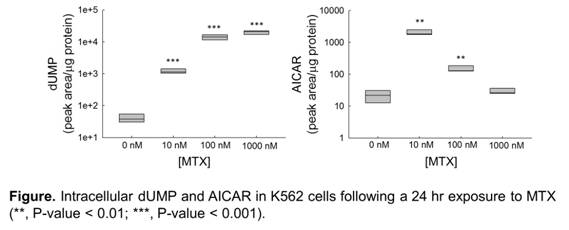Session Information
Session Type: Abstract Submissions (ACR)
Background/Purpose: Current evidence suggests that the anti-folate methotrexate (MTX) mediates its anti-inflammatory effects through inhibition of the purine synthesis pathway causing the accumulation of aminoimidazolecarboxamide ribotide (AICAR). Meanwhile, the anti-proliferative effects of MTX have primarily been attributed to inhibition of the pyrimidine synthesis pathway, marked by the accumulation of deoxyuridine monophosphate (dUMP). Therefore, identification of factors that affect MTX selectivity for purine synthesis pathway inhibition may be important in predicting and enhancing drug response in immuno-inflammatory diseases.
Methods: K562 erythroblastoid cells (~2.5 x 105 cells/mL) were exposed to 0, 10, 100 and 1000 nM MTX under normal culture conditions for up to 24 hr. Cell samples (~2.5 x 106 cells) were harvested after 1, 2, 4, 8 and 24 hr of MTX exposure. Cell lysates were analyzed for AICAR, dUMP, MTX and six different oxidation/methylation states of tetrahydrofolate, including 5-methyltetrahydrofolate (5mTHF); the polyglutamate distribution was also determined for each folate species and MTX. Mean concentrations and standard deviations from three independent experiments are reported. Statistical evaluations were conducted by unpaired Student’s t-tests and statistical significance was defined by a P-value < 0.05.
Results: The primary effect on intracellular folates was a depletion of 5mTHF to levels at 24 hr that were 80%, 3% and 1% of control (0 nM MTX) in response to 10, 100 and 1000 nM MTX challenge, respectively with no effect on cell viability. Similarly, intracellular dUMP accumulated to levels 29-, 343- and 486-fold greater than control after a 24 hr exposure to 10, 100 and 1000 nM MTX, respectively. In the presence of 10 nM MTX, AICAR accumulated 93-fold compared to vehicle treated cells at 24 hr, however, increasing [MTX] had a paradoxical effect, resulting in lower AICAR concentrations. Across all experimental conditions intracellular [MTX] correlated with the intracellular accumulation of dUMP (r2=0.854) and depletion of 5mTHF (r2=0.860), but poorly with intracellular AICAR accumulation (r2=0.122).
Conclusion: Under these experimental conditions, increasing concentrations of MTX beyond 10 nM did not result in concentration-dependent increases in AICAR accumulation, and higher doses of MTX appeared to minimize the effects on the purine pathway, despite having profound effects on pyrimidine synthesis. Although the mechanism for this paradoxical effect on AICAR accumulation is currently under investigation, these findings support the hypothesis that low-dose MTX selectively targets the purine biosynthesis pathway and may result in improved anti-inflammatory effects.
Disclosure:
R. S. Funk,
None;
L. van Haandel,
None;
M. L. Becker,
None;
J. S. Leeder,
None.
« Back to 2012 ACR/ARHP Annual Meeting
ACR Meeting Abstracts - https://acrabstracts.org/abstract/low-dose-methotrexate-and-the-selective-accumulation-of-intracellular-aminoimidazolecarboxamide-ribotide/

